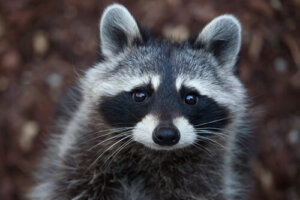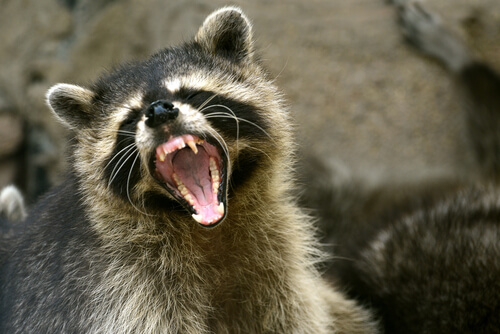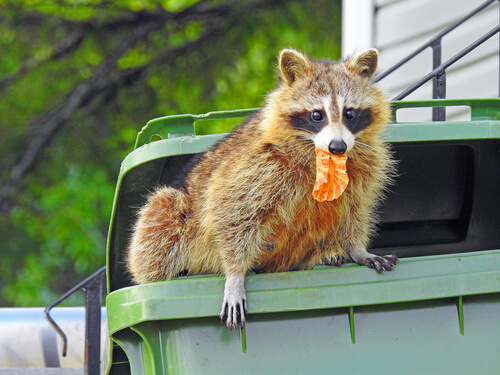Can You Keep a Raccoon as a Pet?

“Original’ pets, that is, those that are rather out of the ordinary, are in fashion, and more and more people are choosing different animals to keep them company at home. So, on these lines, do you think it’s possible to have a raccoon as a pet? Do you fancy the idea? Well, don’t miss this information.
A raccoon as a pet, is it possible?
Yes, it is possible to have a raccoon as a pet. Although you won’t find them in pet shops, you can adopt one through private breeders. It’s difficult for a pet shop to provide one, as the raccoon isn’t considered to be a pet, as its behavior is usually quite different from a pet.
Restrictions in some countries
The laws in some countries restrict the possibility of having a raccoon as a pet, as it’s considered an invasive species. In fact, Spain and some states in North America prohibit it completely, while several Latin American countries only allow it if certain special permits are presented.
In fact, in Spain and in some North American states it is forbidden to have raccoons as pets, since they have been awarded the extirpation and extinction of several native species. While in several Latin American countries they only allow it if certain special permits are presented.
Before acquiring any exotic pet, remember to ask for documentation that proves its origin. This will ensure that the animal doesn’t come from illegal trade organizations or individuals. However, it’s also an essential requirement to request the permits you need with your government.
Is it a good idea to have a raccoon as a pet?
Raccoons are not domesticated animals, so their ‘animal instinct’ is still intact and they live their lives as if they were in the wild. Despite their cuddly appearance and some cute gestures, they’re often aggressive, boisterous, and loud. Of course, this isn’t a general rule, as not all of them are like this, and some specimens break the rules.

If, even after knowing all this, you’d still like to take a risk and have a raccoon as a pet, you’ll need to know how to look after this animal.
Remember that no matter what species you choose as a pet, they’ll be your responsibility. Not only will you have to take care of it and supply all its basic needs, but also be responsible for any of the consequences of owning one.
Raccoon pet care
Choose a suitable place
Unlike dogs and cats, a raccoon can’t live in small spaces such as a flat. If you want to adopt a raccoon, you should make sure you have a suitable area for it, such as a large terrace or a large garden.
First of all, you must understand that a raccoon is a wild animal and that, even though you won’t be able to recreate their natural habitat, you must provide an area that resembles it as much as possible.
Let them loose
You may be afraid that they’ll escape, especially the first few days, when you still don’t know each other too well. The best thing to do is to put up high fences to prevent it from escaping. Under no circumstances should you tie the animal up or put it in a cage; this will only sour its character and it could become aggressive.
The raccoon needs some freedom to move around, but don’t worry. If it sees that it has what it needs by your side, then it won’t want to leave.
Food
At this point, you’re probably wondering what a raccoon eats? Well, raccoons are omnivores, and its main food will be white meat, fish, fruit, and vegetables. Never give it red meat or blue fish, as its stomach isn’t designed to digest them.

If this seems too difficult for you, then wet cat food is also suitable for a raccoon. This will provide all the necessary nutrients and they love it! Needless to say, fresh, clean water should never be lacking.
Raccoon hygiene
Excessive bathing damages a raccoon’s fur, so bathing only a couple of times a year is enough. Raccoons don’t usually smell bad and will lick themselves to groom themselves, just like cats. However, if you think your raccoon is starting to smell, and it isn’t yet time for a bath, then you can opt for a “dry clean”.
What is important with regard to hygiene, is to look after their fur. It’ll need to be brushed daily, especially at the time of year when it sheds its fur.
Train them
Due to its innate character, you need to spend time training your raccoon from a young age. It must learn what the limits are and that you are the one in charge. Of course, as with other animals, punishments, yelling, and hitting are out of the question. Positive reinforcement will be the most effective way to train your raccoon.
Accept that there’ll be certain behavior patterns that are part of their nature, which will be more repetitive, especially at first. If you consider it necessary, you could go to see a professional.
Take them to the vet
You must keep in mind that your raccoon will need the same attention as other pets, and you’ll have to take care of its health by taking it to the vet. The biggest problem with this is that not all animal health professionals can deal with exotic pets. Therefore, consider doing some research beforehand to avoid complications.
Keeping your raccoon in excellent health also benefits you, as certain diseases can be passed on to you. For this reason, it’s always advisable to be careful when handling them and to use protective gloves. Some pathologies that can affect both of you are the following:
- Bailisascariasis: An infection caused by an endoparasite. It doesn’t usually cause problems to the raccoon unless it has a severe infestation, but it can spread to people who live with him. For humans, it’s a dangerous and potentially lethal infection.
- Rabies: A contagious viral disease that will always cause the death of the carrier. It’s spread only by contact with the secretions of an infected animal, so both you and your pet can become infected. Preventive rabies vaccination is the best solution.
- Giardiasis: A parasite that causes minor problems in your pet’s intestine. This disease is transmitted by eating contaminated food or through animal feces. Be careful because you can also become infected.
The raccoon is an animal that isn’t usually suitable as a pet, although it’ll certainly entertain you with its antics. If you decide to take on the responsibility, don’t forget to take into account the care tips we’ve told you about, as well as all our recommendations, and this will make it easier for you to become “friends”!
“Original’ pets, that is, those that are rather out of the ordinary, are in fashion, and more and more people are choosing different animals to keep them company at home. So, on these lines, do you think it’s possible to have a raccoon as a pet? Do you fancy the idea? Well, don’t miss this information.
A raccoon as a pet, is it possible?
Yes, it is possible to have a raccoon as a pet. Although you won’t find them in pet shops, you can adopt one through private breeders. It’s difficult for a pet shop to provide one, as the raccoon isn’t considered to be a pet, as its behavior is usually quite different from a pet.
Restrictions in some countries
The laws in some countries restrict the possibility of having a raccoon as a pet, as it’s considered an invasive species. In fact, Spain and some states in North America prohibit it completely, while several Latin American countries only allow it if certain special permits are presented.
In fact, in Spain and in some North American states it is forbidden to have raccoons as pets, since they have been awarded the extirpation and extinction of several native species. While in several Latin American countries they only allow it if certain special permits are presented.
Before acquiring any exotic pet, remember to ask for documentation that proves its origin. This will ensure that the animal doesn’t come from illegal trade organizations or individuals. However, it’s also an essential requirement to request the permits you need with your government.
Is it a good idea to have a raccoon as a pet?
Raccoons are not domesticated animals, so their ‘animal instinct’ is still intact and they live their lives as if they were in the wild. Despite their cuddly appearance and some cute gestures, they’re often aggressive, boisterous, and loud. Of course, this isn’t a general rule, as not all of them are like this, and some specimens break the rules.

If, even after knowing all this, you’d still like to take a risk and have a raccoon as a pet, you’ll need to know how to look after this animal.
Remember that no matter what species you choose as a pet, they’ll be your responsibility. Not only will you have to take care of it and supply all its basic needs, but also be responsible for any of the consequences of owning one.
Raccoon pet care
Choose a suitable place
Unlike dogs and cats, a raccoon can’t live in small spaces such as a flat. If you want to adopt a raccoon, you should make sure you have a suitable area for it, such as a large terrace or a large garden.
First of all, you must understand that a raccoon is a wild animal and that, even though you won’t be able to recreate their natural habitat, you must provide an area that resembles it as much as possible.
Let them loose
You may be afraid that they’ll escape, especially the first few days, when you still don’t know each other too well. The best thing to do is to put up high fences to prevent it from escaping. Under no circumstances should you tie the animal up or put it in a cage; this will only sour its character and it could become aggressive.
The raccoon needs some freedom to move around, but don’t worry. If it sees that it has what it needs by your side, then it won’t want to leave.
Food
At this point, you’re probably wondering what a raccoon eats? Well, raccoons are omnivores, and its main food will be white meat, fish, fruit, and vegetables. Never give it red meat or blue fish, as its stomach isn’t designed to digest them.

If this seems too difficult for you, then wet cat food is also suitable for a raccoon. This will provide all the necessary nutrients and they love it! Needless to say, fresh, clean water should never be lacking.
Raccoon hygiene
Excessive bathing damages a raccoon’s fur, so bathing only a couple of times a year is enough. Raccoons don’t usually smell bad and will lick themselves to groom themselves, just like cats. However, if you think your raccoon is starting to smell, and it isn’t yet time for a bath, then you can opt for a “dry clean”.
What is important with regard to hygiene, is to look after their fur. It’ll need to be brushed daily, especially at the time of year when it sheds its fur.
Train them
Due to its innate character, you need to spend time training your raccoon from a young age. It must learn what the limits are and that you are the one in charge. Of course, as with other animals, punishments, yelling, and hitting are out of the question. Positive reinforcement will be the most effective way to train your raccoon.
Accept that there’ll be certain behavior patterns that are part of their nature, which will be more repetitive, especially at first. If you consider it necessary, you could go to see a professional.
Take them to the vet
You must keep in mind that your raccoon will need the same attention as other pets, and you’ll have to take care of its health by taking it to the vet. The biggest problem with this is that not all animal health professionals can deal with exotic pets. Therefore, consider doing some research beforehand to avoid complications.
Keeping your raccoon in excellent health also benefits you, as certain diseases can be passed on to you. For this reason, it’s always advisable to be careful when handling them and to use protective gloves. Some pathologies that can affect both of you are the following:
- Bailisascariasis: An infection caused by an endoparasite. It doesn’t usually cause problems to the raccoon unless it has a severe infestation, but it can spread to people who live with him. For humans, it’s a dangerous and potentially lethal infection.
- Rabies: A contagious viral disease that will always cause the death of the carrier. It’s spread only by contact with the secretions of an infected animal, so both you and your pet can become infected. Preventive rabies vaccination is the best solution.
- Giardiasis: A parasite that causes minor problems in your pet’s intestine. This disease is transmitted by eating contaminated food or through animal feces. Be careful because you can also become infected.
The raccoon is an animal that isn’t usually suitable as a pet, although it’ll certainly entertain you with its antics. If you decide to take on the responsibility, don’t forget to take into account the care tips we’ve told you about, as well as all our recommendations, and this will make it easier for you to become “friends”!
All cited sources were thoroughly reviewed by our team to ensure their quality, reliability, currency, and validity. The bibliography of this article was considered reliable and of academic or scientific accuracy.
- Rodríguez, A. M., & Miranzo, B. M. CARACTERIZACIÓN Y SELECCIÓN DE HÁBITAT DEL MAPACHE (PROCYON LOTOR L.) EN EL PARQUE REGIONAL DEL SURESTE, MADRID. (Tesis de maestría, Universidad Complutense de Madrid).
- Centers for Disease Control and Prevention. (2018). Parasites – Baylisascaris infection. Recuperado el 27 de octubre de 2022, disponible en: https://www.cdc.gov/parasites/baylisascaris/index.html
- Salgado, I. (2015). Mapache – Procyon lotor. En: Enciclopedia Virtual de los Vertebrados Españoles. Salvador, A., Barja, I. (Eds.). Museo Nacional de Ciencias Naturales, Madrid. http://www.vertebradosibericos.org/
- Boletín Oficial del Estado. (2020). Ley 42/2007, de 13 de diciembre, del Patrimonio Natural y de la Biodiversidad. Recuperado el 27 de octubre de 2022, disponible en: https://www.boe.es/buscar/act.php?id=BOE-A-2007-21490
- Salgado, I. (2018). Is the raccoon (Procyon lotor) out of control in Europe?. Biodiversity and Conservation, 27(9), 2243-2256.
This text is provided for informational purposes only and does not replace consultation with a professional. If in doubt, consult your specialist.








